









Editor Rebecca Carr editor@familiessolenteast.co.uk 07789 882467
Sales Claire Clarricoates claire.clarricoates@familiespublishing.co.uk 07812 218331
Next issue: November/December Booking deadline: 5 October

















Editor Rebecca Carr editor@familiessolenteast.co.uk 07789 882467
Sales Claire Clarricoates claire.clarricoates@familiespublishing.co.uk 07812 218331
Next issue: November/December Booking deadline: 5 October






At Portsmouth High Pre-School children are inspired, motivated and encouraged to be curious and develop a love of learning.
To enhance provision further, from September 2024, the school is tailoring its approach to teaching children in Pre-School. The size of the teaching space is increasing through the addition of a second classroom giving pupils access to a wider range of activities to enhance their learning. Classes will be split into a nursery class for the youngest pupils and a Pre-Reception class for older pupils starting Reception in the following September. This change will enable older pupils to focus on their learning in greater depth in readiness for starting school.
Head of Early Years, Mrs Fabre De La Grange, said ‘We are delighted to announce this bespoke approach to learning for our youngest pupils. It will enable a seamless start to Reception with children being even better prepared and ready for school. Our new Reception classroom will be a bespoke space full of engaging learning opportunities with a dedicated fenced outdoor play area alongside.’
Prospective parents are warmly invited to come and explore the new space at an Open Morning on Saturday 21 September. Call Admissions on 023 9282 4916, email admissions@por.gdst.net or scan the QR code.

What does outdoor learning look like in Reception and can it really give children superpowers? Caroline Oglethorpe, Head of Nursery and Pre-Prep at Westbourne House School gives four reasons it can.
Taking risks. When children are encouraged to take risks, a new-found confidence is transferred to other areas of learning.
Climbing boosts handwriting. By pulling themselves up and hanging down, the muscles in the shoulder are well exercised and this has huge benefits for handwriting.
Playdates with nature. Being in nature reduces tension and increases a sense of wellbeing. Children can follow their curiosity freely and question along the way.
Superpowers? Definitely! Children are more independent and don’t ask what they should do. Their style of play is elevated and are open-minded and curious in their approach to learning. Plus, we see greater resilient and their confidence soaring.



As a small, but thriving independent school in the heart of the South Downs National Park, Ditcham Park School offers children an exceptional education from Nursery up to GCSEs.
Pupils leave Ditcham at age 16 ready and equipped to deal with the next phase of their learning with resilience and passion. The school has a strong reputation for sports, academic success and the creative and performing arts with ample opportunities for pupils to really shine in all spheres. Plus, wellbeing is at the heart of everything they do at Ditcham with outstanding pastoral support and a dedicated wellbeing coordinator.
From September, the Nursery will open all year round for 51 weeks of the year to provide parents with more childcare options.
Come and find out more at their next Open Morning on Saturday 28 September, visit www.ditchampark.com to book your place.
To learn more visit the next Open Morning on Saturday 5 October. Register at www.westbournehouse.org/visit or call 01243 782739.
Open days may need pre-booking. Please check before visiting.

Ditcham Park School
Nr Petersfield, GU31 5RN 01730 825659 ditchampark.com
Open Morning
Saturday 28 September Call or book online.
Portsmouth Grammar School
Portsmouth, PO1 2LN 02392 360036 pgs.org.uk
Pre-School, Infant & Junior School Open Events
Thursday 19 September
Wednesday 9 October
Tuesday 5 November
Portsmouth High School Southsea, PO5 3EQ 02392 824916
portsmouthhigh.co.uk
Open Morning Saturday
21 September 10am-12noon Call or book online.
Westbourne House School Chichester, PO20 2BH 01243 782739
westbournehouse.org/visit
Open Morning
Saturday 5 October Call or book online.
Please say you saw these listings in Families magazine!
To feature your school in our next issue, call Claire on 07812 218331.
By Usha Patel
Back in 2007, a mum called Sarah told me of an incident involving her then 8-year-old son, Albi. Sarah had fainted in the bathroom of their small flat. As she was coming round, she called out for her son. He said: ‘Yes, I saw you.’ Sarah reported that Albi carried on playing without concern. Sarah was visibly upset when she recalled her son’s behaviour.
Why had Sarah’s child not been concerned about her? What was the reason Albi appeared aloof? This was not due to a lack of empathy (as his mother had assumed) but an inability to understand the behaviours of others. Albi needed something called ‘theory of mind.’
What is the theory of mind?
A theory of mind is crucial for success in everyday social interactions, understanding others and their possible mental states (happy, sad, confused, etc.). Having theory of mind shows you acknowledge that others have different beliefs, desires, intentions and emotions from your own.
The Sally-Anne Story
Children can be tested on their theory of mind with a classic test called the Sally-Anne Story, where children watch the story acted out (by a therapist) using two dolls named Sally and Anne.
‘Sally places her marble in a basket, covers the basket and leaves the room. After Sally has departed, Anne moves the marble from the basket and places it in the box.’
The child is then asked where Sally will look for the marble when she comes back? To ‘pass’ this task, the child being tested will say that Sally will look in the basket. After all, Sally would not know Anne moved the marble and would assume it was where she had left it: in the basket. The child being tested needs to show that she has understood from Sally’s perspective and taken Sally’s most probable thoughts into consideration.



Here are the stages of theory of mind in a young child:
Perspective-taking
A child recognises that although they know a toy is hidden in a box, another person who was absent during the hiding will not be aware of its location.
Understanding false beliefs
If a friend sees you place a sweet in your pocket but you secretly move it to your bag when they’re not looking, a child with theory of mind realises the friend will mistakenly believe the sweet is still in your pocket.
Empathy
If a friend is crying because they dropped their ice cream, a child with theory of mind will comprehend that the friend is upset, even if that child still has their own ice cream.
Deception
If a child decides to mislead their friend by pointing in the wrong direction when asked about the location of a hidden object, a child with theory of mind will understand that the friend does not know the true location.
Understanding others’ ignorance
A child understands that they learned something new at school and also realises that their parent doesn’t know this information yet because they weren’t at school.
Predicting behaviour
A child expects a friend to look for a missing toy in the last place they left it, demonstrating an understanding of the friend’s beliefs and intentions.
Usha Patel is a neurocognitive therapist with over eighteen years of experience. Visit www.ravivpracticelondon.co.uk to find out more.
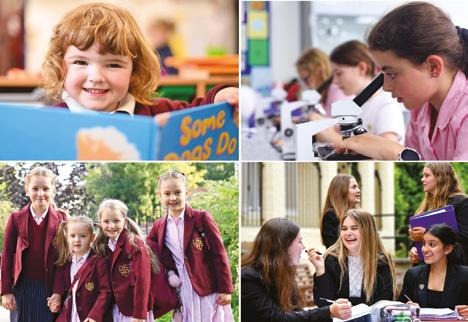

Helping girls’ ambitions take off
Open Morning
Saturday 21 September 10 am to 12 noon
Register online today via the school website or scan the QR code admissions@por.gdst.net
By Sarah Billingham
A recent government report has revealed a steady increase in the number of children with special educational needs (SEN) since 2016, with almost one in six children in schools identified as having SEN. The wait for diagnostic assessment can be lengthy, leaving parents concerned about supporting their child’s special educational needs at home and at school in the meantime.
Working with your child’s school is key for ensuring their needs are met both at school and at home. Meetings with your school’s SENCo will enable you to keep up to date with how your child is being supported so far and what further support they may need.
These are the key questions to ask in each meeting:
How much progress is your child making?
Discussing progress is important. Your child might be learning at a different level from their peers but are they moving in the right direction and at a reasonable pace?
What are the barriers to learning?
Essentially, what is getting in the way of their learning? It might be a subject they find really difficult or a learning behaviour that needs support to help them (attention, listening, perseverance). Sometimes building and maintaining friendships is difficult. Recognising that a child is struggling can be the straightforward part but analysing specific areas that are stopping them from progressing is the crux.
What can be done to help your child overcome these barriers?
A clear plan for both the school and parents will focus the meeting on practical steps to help your child to learn and develop. It can also open up the discussion about whether support from external specialists is required to move provision forward.
When navigating the particular challenges of SEN parenting, it’s important to have the support of other parents facing similar experiences. Community groups for SEN parents provide great solace and comradery.
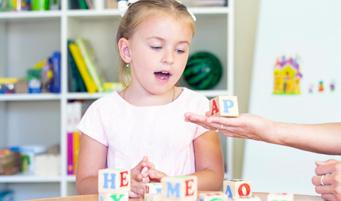
Each local authority has a designated Parent Carer Forum which provides support and social events for SEN families. These forums also work with the local authorities to ensure that parents are regularly consulted and informed about the services which are offered in their area.
Does my child need an EHCP?
An Education Health and Care Plan (EHCP) outlines a child’s needs and the specific provisions required to meet those needs. They bring together provisions from the local education authority, health (NHS) and social care services into one document to support young people until they are 25 years old.
EHCPs are intended for children with long-term, significant needs that require support which is ‘additional to and different from’ what is usually provided by a child’s school. If you are concerned about your child’s development and the amount of support they are getting or might need at school, it is a good idea to talk to the school’s SENCo and to contact charities such as IPSEA (www.ipsea.org.uk) or a SEN advocate to get independent advice on applying for an EHCP and navigating SEN support systems.
The earlier support is given, the more opportunity there is for this support to make a meaningful difference to your child’s development and access to education.
Sarah Billingham is a specialist SEN Advisor and her service Confident Kids (www.confidentkids.co), equips parents, carers and practitioners with expert SEN knowledge and the practical tools they need through training, coaching and group programmes. Check out her podcast at www.bit.ly/ conkidspodcast

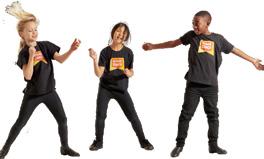
CHICHESTER 07786 336983
stagecoach.co.uk/chichester chichester@stagecoach.co.uk
FAREHAM 07802436358 stagecoach.co.uk/fareham fareham@stagecoach.co.uk
HAVANT AND WATERLOOVILLE 07579 004 288 stagecoach.co.uk/havant havant@stagecoach.co.uk
LIPHOOK & PETERSFIELD 07904 906900
stagecoach.co.uk/liphook liphook@stagecoach.co.uk
PORTSMOUTH 07498 997606 stagecoach.co.uk/portsmouth portsmouth@stagecoach.co.uk

By Erin Miller
At this year’s Hay Festival (the UK’s most prestigious literary event), children’s literature was a hot topic for discussion. Among those commenting were respected and prolific children’s authors, including Antony Horowitz CBE, author of the Alex Rider series, who observed the diminishing quality of children’s literature over the years, stating that ‘proper stories’ are being superseded by ‘silly books.’
There is no doubt that the classics are proper stories, characterised by their originality, complexity and the fact that they have stood the test of time. However, also appearing at the Hay Festival, the current Children’s Laureate, Joseph Coelho, claimed that today’s children would need a dictionary to read classics such as The Wind in the Willows and Treasure Island.
So, if classics are challenging, with sometimes outdated ideas (for example, around gender roles) is it desirable or necessary to get children reading them? My answer is a firm ‘yes.’
As an English teacher with over a decade of experience, I’ve seen hundreds of children connecting deeply with classic texts. I’ve also witnessed children making excellent progress in their reading skills when faced with books that might seem ‘too hard.’
Furthermore, having taught in the Far East, the Middle East and the UK, I know that many of the classics are enjoyed by children across the globe. Universal themes such as friendship touch everyone and are dealt with in the most insightful, exciting and even tragic ways in classic children’s literature.
It is recognised that reading for twenty minutes a day builds vocabulary and academic progress in all subjects. However,
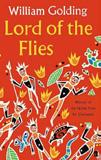


In the primary years, consider the Greek myths. It’s highly likely that your child will encounter some of these at school but translations such as Geraldine McCaughrean’s retelling of The Odyssey will give them the opportunity to read the full adventures. Roger Lancelyn Green’s retelling of King Arthur is also a good version to introduce to younger readers.
It is a universally acknowledged fact that a love of reading drops off in the secondary years. Fortunately, there is a wealth of quality YA fiction out there. But which classics should your secondary-aged child start with? Some classics have dropped off the curriculum, such as Golding’s Lord of the Flies and Steinbeck’s Of Mice and Men. I would highly recommend these books, as their exploration of power, friendship and society will have some resonance with young people finding their way in the world. Orwell’s Animal Farm is another book which really helps to develop young people’s understanding of politics and power, with memorable characters in an unforgettable allegory.

this does actually depend on what your child is reading. With both complexity of plot and language, the classics certainly will ensure vocabulary expansion and provide new or challenging ideas.
In addition, a broad knowledge of classic texts will equip your child with ‘background knowledge,’ which is an essential reading skill that has been proven to compensate for a weaker reading ability.
With AI generative platforms such a ChatGPT, there is a risk that today’s children could struggle with originality and creativity.
By encouraging your child to experience the classics, they will be armed with the stories that built today’s world. They will be exposed to a wide range of ideas to interpret and fuel their ideas in their own writing.
Erin Miller is a teacher with a keen interest in how research can be used in the classroom to improve learning.

As acknowledged already, the classics can be tough to digest for young readers.
Retellings for children can be a good way into the classics, as they will likely be written in modern language, with references that your child can understand. If you have a reluctant reader, try audiobooks first. Whilst listening is not found to accelerate academic progress in the way reading does, your child will still be soaking up the complex ideas within the classics.
Using a dictionary seems an archaic skill to some but all children should be encouraged to use physical dictionaries, as it gives them independence in their reading. If you allow screens, then the Kindle does have the benefit of being able to locate word definitions immediately.
Most importantly, have conversations with your child about the stories. Probe them about what they think about characters and what they believe the deeper ideas are in the stories. In my experience, these conversations at home are the most powerful in shaping young readers.
By Lisa Wander and Catherine Loble
Whilst studies show that children learn better when they experience failure, no parent likes seeing their child upset or disappointed. It feels right to want to keep them happy and content by taking steps to avoid anything seemingly harmful they encounter, whether that be through distraction, bargaining or even with a quick credit-card swipe.
However, whilst these quick wins feel better or even just simpler, safeguarding children from disappointment ultimately hinders them from developing resilience and confidence to progress from childhood to adolescence and in their adult life. When children are given the opportunity to struggle and sometimes fail, you are helping them develop essential social and emotional skills.
What is disappointment and failure? Disappointment is a natural response to failure. It involves the feelings of thwarted desire, loss and discouragement when children fail to fulfil their hopes and expectations or those of others. Children are going to feel disappointment when they don’t achieve their goals or believe that they have let you down.
The stigma surrounding failure is a significant issue that impacts a child’s development, confidence and willingness to take risks. Both close family and society place high expectations on children to succeed academically and socially, which can often lead to an intense fear of failure. The emphasis on continual testing in our education system reinforces a narrow definition of success and failure too. If a child does not reach certain benchmarks, they are often labelled a failure. This can lead to a downward spiral effect with children reducing their efforts,


giving up easily and not taking risks. Children who fall into this spiral may subsequently have little confidence, self-esteem and motivation to achieve future goals.
So how do we not feel completely defeated as parents when we have to watch our child suffer?
Placating your children doesn’t allow them to understand the root causes and figure out how to not feel disappointed in the future. Rather we should let them flex their muscles and with support, encourage them to find solutions themselves. In giving our children the necessary skills to manage disappointment, it is important to validate their feelings, show empathy and be mindful of how you react towards your own disappointments.
Lisa and Catherine are co-founders of Emparenting (www.emparenting.co.uk), supporting children, parents and families with the insights, skills and tools needed to nurture the development and wellbeing of the next generation.


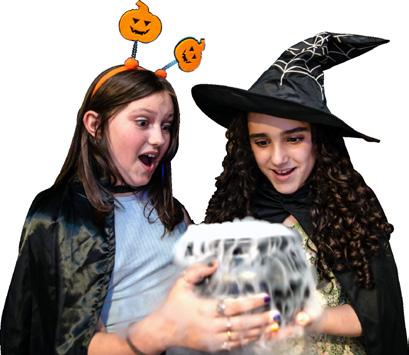







By Ellie Malt
From the time we become parents, we can’t seem to help ourselves sharing our child’s milestones. But how does that make other parents feel? And does it ever stop? For instance, is it okay to tell others that your child has just got the lead in the school play or won a place at Cambridge? We asked two mums and found two very different points of view on this.
‘Being proud out loud can be a really positive thing to do in front of your child’

Being a parent can feel like a long line of failures and it’s very easy to get upset about the things that we find a struggle. For me, it’s a regular battle to get my child to leave their favourite computer game and do their homework instead. It feels like groundhog day when I constantly have to remind them to tidy their stuff.
So, when things do go well for a change, taking a moment to celebrate with others seems fair enough. I realise talking about your own kid’s achievements sometimes just comes across as boasting. But what might seem like bragging could be a parent trying to make up for a lack of achievement in another area. For example, if my child is bottom of the class in maths, I might feel it’s okay to talk up their sporting achievements to other parents. I realise that can be annoying for the parent whose child has no sporting ability but isn’t that all right if their child is doing really well in another area? They might be really advanced in maths, for example. I think it all balances out in the end.
Being proud out loud can be a really positive thing to do in front of your child as it can help boost their confidence and help them to feel good about themselves.
Clare, mother of three boys in Cheshire
It’s okay to be proud of your kid when…
Most parents agree it’s okay to talk about your child’s successes when you are with their grandparents or a close friend who also understands your challenges.
Balancing out triumphs with a few ‘fails’ can make it sound less like boasting. When sharing a win with another parent, try complimenting their child as part of the same conversation.
If a friend frequently tells you how great their kid is, why not share your child’s achievements too?
‘I don’t want them growing up trying to please others all the time’

When my eldest girl was born, I remember hearing from other new mums about how their babies were sleeping through the night and it generated a lot of anxiety for me. Then, later on, when the other mums were getting really excited about first steps, it was a similar feeling. Even though I told myself that every child will develop at their own pace, it’s still hard to hear when you feel your child is falling behind. I think it can be hurtful as well. I have seen parents brag about their child’s academic achievements to parents whose children have health problems and learning disabilities.
When other parents tell me how proud they are, it definitely leads on from comparison to a sense of judgement. Is that parent claiming responsibility for their children’s achievements? The achievement is probably nothing to do with parenting and just down to a unique genetic accident. I don’t love it when people send letters at Christmas to all their friends about all the successes in their family over the year. Now it’s even worse when every little milestone gets posted onto social media every day.
Although my girls like hearing me talk about their achievements, the main thing is they should be happy with themselves. I don’t want them to grow up trying to please others all the time or to only feel happy if they are doing something better than others.
Georgie, mother of two girls in Berkshire
Hold off mentioning successes if your friend’s child is having difficulties. Even innocent conversations can seem insensitive eg talking about your child’s friendships is unlikely to go down well with the parent of a shy child.
Sharing how proud you are is risky with someone you haven’t seen for a while. Their child might be struggling, putting similar achievements out of reach. Sharing successes on social media means you will almost certainly be posting to someone currently feeling worried.
By Tanith Carey
To a young child, money is a magical commodity which allows grown-ups to go into shops and take anything they want. And it’s not just about understanding where money comes from and how it’s used: in an increasingly cashless society, money is even more of an abstract concept for kids to grasp.
In the days of coins and notes, children could see that money was something tangible, used for goods and services; and that it could run out. Now that we can just tap and go, kids don’t even see money being exchanged. So, it’s even harder for them to see that it’s not an unlimited resource. This requires parents to put a little more thought into helping kids understand how finances work. After all, managing money is a lifelong skill, bringing a range of key benefits.
As well as boosting their maths, money teaches kids how to control their impulses, develop patience, delay gratification; and ultimately spend wisely throughout life. Indeed, according to research by Cambridge University, attitudes to money are formed by around the age of 7.
Practical life lessons
Kids first grasp what money represents around the age of 6. Start by paying them their first pocket money in coins to make it tangible. Give them a see-through jar so they can see it disappear when they spend it. When you’re out and about, try to use cash as well as cards. Each time you do use your card, explain it’s the same as having the same amount taken out of your ‘jar,’ aka your bank account. As they get older, start sharing your own spending decisions too.

Pay pocket money as in the real world: a fixed allowance on the same day each week, just like a wage and it’s their responsibility as to how to spend it. This teaches the value of money and that it’s not an unlimited resource.
Help them track their money on screen: if you give them a prepaid debit card, as many parents do, show them their balance on a family tablet. Watch the numbers go up and down together.
Let them earn: come up with some small jobs around your home and set a price for them. When you transfer their pay, let them see it pop up on screen. This will show how work earns money and how money gets transferred.
Play board games: Money-based board games like Monopoly and Pay Day still use old-fashioned play bank notes and can also introduce concepts like debt, mortgages, taxes and saving.

Talk about it. For example, when you go to buy an ice-cream with them, chat through the different prices for each item. Explain how the higher the cost, the more money will go out of your bank account. When you go to pay, rather than just tap, show your child the amount displayed on the card reader so they link what you’re buying to the money it costs.
Explain that if you spent all your money on ice-creams, you would have less to spend on other more important items you all need, namely food, clothes and travel.
Pocket money is one of the seventy five real world scenarios tackled in the book What’s My Tween Thinking? Practical Child Psychology for Modern Parent co-authored by Tanith Carey with Dr Angharad Rudkin, published by DK books and available now from www.bookshop.org
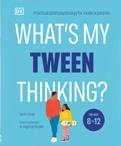

Share your spending decisions
Parents often don’t share with children how much money they have or how they make financial decisions. So kids may believe you have an unlimited amount and one day they’ll be the same. To help them think responsibly, calmly share some of your own money management decisions. When you’re out shopping, chat through your choices and how you compare prices. You might also show how your purchases affect your bank balance, so they learn basic cause-and-effect.
Talk about the difference between a ‘need’ and a ‘want’
In a tap-and-go society, it’s easier than ever to use a card to buy an item without thinking. That’s why it’s important to introduce some ‘friction’ to slow down the process. When you buy something, talk about the difference between a ‘need’ and a ‘want.’ Explain that ‘needs’ are everything you require to survive, like food, shelter. ‘Wants’ are complementary add-ons which are nice to have but you can live without them.
NEW CLASS in Chichester Sep 2024

As the buzz of the new school year begins, why not enrich your child’s after-school routine with something truly special.
Perform’s dynamic classes are expertly crafted to enhance your child’s confidence, concentration, communication and co-ordination – skills that complement their academic journey. Sessions are packed with drama-based games and activities which allow reserved children to come out of their shell whilst energetic children have the perfect outlet to express themselves.
“My son is extremely shy, socially anxious and self-conscious but he LOVES Perform. I’m so grateful to the teacher for making my little boy feel so happy and valued!”
“The teaching team are truly amazing. They have had such a positive impact on my children’s confidence levels.”
This term, ages 4-7 are off to Outer Space on an intergalactic adventure with the Sparkly Spaceman and the Man on the Moon! While ages 7-12 will enjoy a groovy Greek extravaganza in The Hercules Beat, where Hercules gets everyone dancing to stay fit.
Try a FREE class, visit www.perform.org.uk/try to book.
More about Perform’s weekly classes
Confidence building weekly drama, dance and singing classes for 4-7s and 7-12s, designed to boost confidence, communication, concentration and co-ordination.
To book a FREE class in one of the following venues, visit www.perform.org.uk/try, email enquiries@perform.org.uk or call 020 7255 9120.
NEW Chichester: St Michael’s Church Hall, PO19 6PN Ages 4-7, Monday 4.15pm, Ages 7-12, Monday 5.20pm
Fareham: Catisfield Memorial Hall, PO15 5NN Ages 4-7, Tuesday 4pm, Ages 7-12, Tuesday 5pm
Petersfield: St Peter’s Hall, GU32 3HZ Ages 4-7, Monday 4pm, Ages 7-12, Monday 5pm
Southsea: St Simon’s Church Hall, PO5 2PW Ages 4-7, Monday 4pm, Ages 7-12, Monday 5pm

By Andrew Campbell
When you think it’s time for a change in an after-school club or class for your child, whether moving from dancing to swimming or to another class offering the same activity, take into consideration both the advantages and disadvantages.
One important benefit of changing extracurricular activities is the exposure to new challenges and opportunities. Trying something new can stimulate your child’s mind and body differently, fostering more well-rounded development.
For instance, if your child has been involved in dancing, switching to swimming will introduce a new set of physical demands and skills. Learning to adapt to new environments and expectations builds resilience and versatility; valuable traits that will serve children well throughout their lives.
Similarly, if your child no longer feels excited or challenged by the class they are taking but still wants to stick to the same activity, it could be worth finding a new provider better suited to where they are now at.
Changing activities can also provide your child with the opportunity to make new friends. Each extracurricular environment has its unique social circle. Transitioning to a new activity introduces your child to peers they might not have met otherwise.
However, there are disadvantages. One key drawback is the potential loss of continuity with an instructor or teacher familiar with your child’s unique skills, capabilities and personality.
A leader who understands your child’s strengths and weaknesses can tailor their guidance to maximise your child’s progress. Switching to a new class or activity means starting from scratch.
Moreover, changing activities can result in the loss of the progress achieved in the current activity. Many extracurricular pursuits, such as martial arts, dance or music, have structured grading systems that mark progress.
Moving to a different activity might mean giving up hard-earned advancements and starting a new grading structure from the beginning.
Maintaining established friendships within the current activity should not be underestimated either. Consistent social interactions help children build strong bonds and a sense of belonging. Switching to a new activity involves entering an unfamiliar social environment where fitting in might be challenging. The risk of not integrating well into the new group could lead to feelings of isolation or disappointment.
07789 882467
Ultimately, deciding to change extracurricular activities should be guided by thoroughly understanding your child’s preferences, strengths and needs. Engage in open conversations with your child about their interests and feelings regarding both the current and prospective activities.
By Ashley Lutz
Wondering where to head with the family in 2025 for your next adventure? Whether you are looking for winter sun, a bucket list holiday ticked off the list or an epic road trip, here are some top picks for families of all ages and stages.

If you’re planning a trip to the UAE you might be wondering which is better, Dubai or Abu Dhabi? Abu Dhabi is an incredibly child-friendly destination and a great choice for families looking for winter sun. Offering a more relaxing destination, better value for money, lovely beaches and plenty of kids’ activities, from famous museums and magnificent mosques to desert safaris and beautiful mangroves.

Beyond the capital, seaside destinations and major cities such as Split or Dubrovnik, Croatia can offer unique experiences to families who prefer to go off the beaten track in lesser-known but equally beautiful destinations. From quaint villages nestled in the countryside to secluded beaches tucked away from the crowds, Croatia has plenty of off-the-beaten-path experiences to offer for the perfect summer holiday.

Iceland’s incredible landscape is an endless source of wonder no matter your age and exploring it with the family will create memories that will last a lifetime. In Reykjavík and the vicinity, you’ll find restaurants, swimming pools and the largest variety of children’s activities. Hunt for the Northern lights, spot whales, watch live volcanoes and take a soak in the warm waters of the Blue Lagoon!

Gorgeous white sandy beaches, delicious cuisine, lush rainforests and ancient civilisations mean families are spoilt for choice with a holiday in Mexico. The Rivera Maya between Cancun and Tulum boasts a diverse range of fantastic family-friendly hotels, from fun-filled beach resorts to luxury tropical hideaways and with direct flights from the UK to Cancun, travelling there couldn’t be easier.

From discovering your favourite ride at the world’s greatest theme parks in Orlando, learning to surf in tropical Hawaiian oceans or transforming into a cowboy at one of the Wild West’s ranches, there is a perfect USA family holiday for you! There are many ways to explore the USA which can be tailor-made to create your own unique family holiday.

Whether you are thinking about a crisp winter break or a warm sunny holiday, Switzerland will leave you and the family wanting to come back for more! With so many exciting museums, snow parks and slopes, action-packed rope parks and toboggan runs, pristine lakes and rivers, the whole family will enjoy an unforgettable trip and you can explore the country from the comfort of the excellent transport system.

Do you prefer winter or summer in the Alps… or both?
Francesca, Paul and their three children live in Morzine in France all year round and have a good knowledge of Alpine traditions and the Morzine people.
Having adapted their chalet holiday style over the years to suit the tastes of their regular guests, they offer the perfect ski and summer holidays for either families, couples or mixed groups in relaxing luxury, serving fantastic food and boasting outstanding facilities, with unrivalled in-house childcare facilities. For many returning guests Chilly Powder is considered a real home from home.
For more about Chilly Powder chalets for summer and winter visit www.chillypowder.com
All listings correct at the time of going to print. Please check with the venue before visiting to ensure events are still going ahead and the venues are open.
Ongoing
Treasure Trails across South East Hampshire and West Sussex
A self-guided spy mission walking trail or treasure hunt inspired walk. Trails are 2 to 2.5 miles and take approximately two hours. Print a map at home or buy online. treasuretrails.co.uk
Ongoing
‘50 Things’ Activities at The National Trust
Why not try some of the ‘50 things to do before you’re 11¾’ challenges? There’s something for every young explorer to do. nationaltrust.org.uk
Ongoing
Gruffalo Party Trail at Alice Holt Forest, GU10 4LS
The interactive family trail features party-themed activities and games, along with fun facts to teach you about life in the forest for the Gruffalo and other creatures. £4. 9am-4pm. Ages 3-9. forestryengland.uk/alice-holtforest
Every Wed (term time only)
Mini Makers & Shakers at Chichester Festival Theatre, PO19 6AP
Take part in fun activities for 2-5 year olds. Choose from Storytime Rhymes, Little Artists and Mini Movers. cft.org.uk
Every Thu & Sat (term time only)
Family Fun at Chichester Festival Theatre, PO19 6AP
A weekly expansion of CFT’s family-friendly spaces. Bring your pre-schoolers Thu 10am–12pm, Sat 9am–12pm. Ages 0-5. FREE. cft.org.uk
Every Thu (term time only)
Little Notes at Chichester Festival Theatre, PO19 6AP
Take part in live music, led by classically-trained opera singer and musician Mark Bradbury. Ages 0-4. cft.org.uk
Every Sat Family Saturdays at Aspex Gallery, Portsmouth, PO1 3BF
A different creative activity each week, from painting to model making - these free creative workshops are fun for all the family. aspex.org.uk
Every Sat
Family Fun at Gosport Discovery Centre, PO12 1BT
Come along and play with board games, try a puzzle and build with construction bricks. 2-3.30pm. FREE.
Sun 8 Sep & Sun 13 Oct
Sunday Waterside Market at Port Solent, PO6 4TP
This market offers a diverse range of goods and services, from fresh produce, artisan food to handmade crafts and gifts. 11am-5pm. portsolent.com
Sat 14 & Sun 15 Sep
Games Fest at Portsmouth Guildhall, PO1 2AB
Calling serious gamers and casual console players. Games Fest will return offering three sessions of pure gaming glee. All ages. portsmouthguildhall.org.uk/whatson/event/games-fest
Sat 14 & Sun 15 Sep
Heritage Open Days at Fort Nelson, PO17 6AN
Join a special tour of some of the behind-the-scenes places at Fort Nelson not normally open to the general public. 11am, 1pm, 3pm.

It’s trick or treat season and Winchester Science Centre is pulling out all the stops to fill this one with fiendish science fun!
Between Saturday 20 October and Monday 4 November, there’ll be all the usual Science Centre fun, plus even more to excite all ages at Science Spooktacular – and it’s all included with admission.
Families can swap spooky scares for frightful fun on the trick or treat trail. They’ll be wowed by epic chemistry demos in the brand new free live show, Potions Science Lab. And little werewolves, witches and ghouls can show off their best moves on the dancefloor at the mini monster disco.
Visit winchestersciencecentre.org for more information and to book tickets.
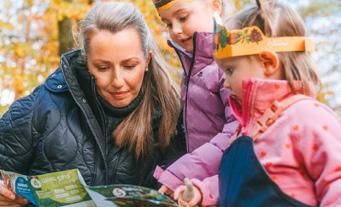
Tours are 60 minutes. FREE. royalarmouries.org/fort-nelson/ whats-on
Sat 14 & Sun 15 Sep
Heritage Open Days at Petworth House, GU28 9LR
Discover more about Petworth’s history and collection on this weekend with FREE entry. 10am5pm. Pre-book. nationaltrust.org.uk/petworth
Sat 14 & Sun 15 Sep
Minature Steam Show at Amberley Museum, BN18 9LT
See over 40 miniature and model steam engines. There will also be a parade of all the engines on display ending in one place. 10am-4.30pm. amberleymuseum.co.uk/whats-on/ miniature-steam-show
Sun 15 Sep
Park Yoga at Queen Elizabeth Country Park, PO8 0QE
Take time to focus on your health and wellbeing with an outdoor yoga session at the country park. 9.30am. All ages. FREE. hants.gov.uk/thingstodo/ countryparks/qecp
Tue 17 & Wed 18 Sep
The Very Hungry Caterpillar at New Theatre Royal, PO1 2DD
Featuring a menagerie of 75 lovable puppets. The production faithfully adapts four stories by author/ illustrator Eric Carle. Ages 2+. newtheatreroyal.com
Sat 21 Sep
Family Bat Walk at Baffins Pond, PO3 6PB
Learn exciting facts about these amazing animals and how to use a bat detector (provided) to listen to the bat’s echolocation calls and identify the species present. £5pp. Pre-book only. Ages 5-15. hiwwt.org.uk/events/2024-09-21portsmouth-and-southsea-wildlifewatch-family-bat-walk
Sat 21 Sep
Equinox Viking Boat Burn –Saxon & Viking Fire Festival at Butser Ancient Farm, PO8 0BG
An incredible day of spectacular entertainment, straight from Valhalla itself. Witness live folk music, reenactor warrior battles, traditional crafts and the burning of a Viking longship at dusk. 4-8.30pm. butserancientfarm.co.uk
Sat 28 Sep
Cirque – The Greatest Show at Kings Theatre, PO5 2QJ
It’s time to step into the light. Escape with us for a night like no other, where we take you into a world where the very best of musical theatre showstoppers meets jawdropping circus spectacular. kingsportsmouth.co.uk/whatsonevent/cirque-the-greatest-show
Sat 28 Sep
Creative Saturday Workshop at Petersfield Museum and Art Gallery, GU32 3HX
Get creative as a family with a range of art workshops suited for all ages and abilities. 10.30am or 1.30pm. petersfieldmuseum.co.uk
Tue 8 to Sun 13 Oct
Charlie and the Chocolate Factory at Kings Theatre, Southsea, PO5 2QJ
Enjoy a world of pure imagination as Roald Dahl’s beloved tale is brought to life on The Kings Theatre stage. kingsportsmouth.co.uk/whatsonevent/charlie-and-the-chocolatefactory
Sat 12 Oct to Mon 4 Nov Science Spooktacular at Winchester Science Centre, SO21 1HZ
Join Skully the skeleton for a fiendishly fun trick or treat trail around the Science Centre. Help reunite them with their lost bones and put them back together again. Enjoy a monster mini disco, live science shows a trick or treat trail, science demos and more. winchestersciencecentre.org
Fri 18 to Sun 20 Oct
The Tiger Who Came To Tea at Fareham Live, PO16 7DB
Join the tea-guzzling tiger in this delightful family show. 1.30pm, 11am, 2pm. Ages 2+. trafalgartickets.com/fareham-livefareham/en-GB/event/family/thetiger-who-came-to-tea-tickets
Fri 18 Oct to Sun 3 Nov
Ten Years of Magic at Rogate Pumpkin Patch, GU31 5EG
To celebrate their 10th anniversary, Rogate have some exciting new attractions and activities to share, alongside all the usual pumpkin fun at their magical pumpkin themed outdoor event. Spooky fun for all ages. Tickets from £5. Pre-book. rogatepumpkinpatch.com
Sat 19 Oct
Illuminate the Skies at Fontwell Park Racecourse, BN18 0SY Bundle up in your coziest clothes and prepare to be dazzled by a breathtaking fireworks display. Family ticket £25. Book online. fontwellpark.co.uk/popular-events/ fireworks
Sat 19 & Sun 20 Oct
Peppa’s Fun Day Out at Kings Theatre, Southsea, PO5 2QJ Join Peppa, along with her family and friends as they go to the zoo and also the beach for a special partyit’s going to be an exciting and fun packed day. kingsportsmouth.co.uk/whatsonevent/peppa-pigs-fun-day-out
Sat 19 Oct to Sun 3 Nov
Halloween at Carisbrooke Castle, Newport, PO30 1XY
Gather your little monsters for a ghoulishly good day out at Carisbrooke Castle. All ages. english-heritage.org.uk
Sat 19 Oct to Sun 3 Nov
Witches and Wizards at Petworth House, GU28 9LR
Take part in a garden trail for different games and activities designed to perfect your magical skill. Ages 4+. 10am-5pm. nationaltrust.org.uk/petworth
Sat 26 Oct
Halloween Family Fun Day at Petersfield Museum and Art Gallery, GU32 3HX
Celebrate Halloween with ghostly crafts, spooky storytelling and traditional games. 11am-4pm. petersfieldmuseum.co.uk/events/ halloween-family-fun-day-0
Sat 26 Oct
Saturday Art and Craft at Pallant House Gallery, PO19 1TJ
Creative and relaxed workshop sessions. Ages 5+. 11am-1pm. pallant.org.uk/whats-on/ workshop-saturday-art-and-craft
Sat 26 Oct to Sun 3 Nov
Halloween Fun at Fort Nelson, PO17 6AN
Spooky games and activities daily. FREE. 10am-5pm. royalarmouries.org/fortnelson
Sat 26 Oct to Sun 3 Nov Halloween at Portsmouth Museum and Art Gallery, Museum Road, PO1 2LJ
Enjoy spooky trails, craft activities and haunted galleries. The trail is £2, crafting activities £3. 10:30am-12pm or 1.30-3.00pm. portsmouthmuseum.co.uk

Sun 27 Oct
Science Museum The Live Show at New Theatre Royal, PO1 2DD
Experience the brand-new stage show which will ignite your curiosity, fuel your imagination and inspire you in new and exciting ways. Ages 6+. newtheatreroyal.com
Sun 27 Oct
Little Monsters Halloween Festival at Portsmouth Guildhall, PO1 2AB
Expect meet and greets with our characters, parachute, giant inflatable balloons, resident DJ, party songs and more. 12.30pm. portsmouthguildhall.org.uk
Mon 28 Oct
Toddler Takeover XI: Pumpkin Party at Petersfield Museum and Art Gallery, GU32 3HX
Entertain your little ones with this spooktacular Toddler Takeover Day. 10am-4pm. petersfieldmuseum.co.uk/events/ toddler-takeover-xi-pumpkin-party
Mon 28 Oct to Fri 1 Nov
October Half-Term Activities at Weald & Downland Living Museum, PO18 0EU
Explore the seasonal trail around the Museum and take part in activities. wealddown.co.uk
Tue 29 Oct
Skulls and Skeletons at Portsmouth Natural History Museum, PO4 9RF
Get up close to some of the animal skulls and skeletons from natural history collections, as well as crafts and activities. 10.30am. FREE portsmouthnaturalhistory.co.uk
Tue 29 to Thu 31 Oct
Halloween Build a Teddy Workshop at Spinnaker Tower, PO1 3TT
Fun-filled day. Build your bear to take home! Book online. spinnakertower.co.uk
Tue 29 to Thu 31 Oct
Craft activities at The D-Day Story, PO5 3NT
Enjoy family-friendly craft activities
WIN a family ticket to see The Science Museum Live Show

The Science Museum is on tour with this brand-new live stage show which is sure to spark curiosity and fuel the imagination of young and old alike! This educational and entertaining experience is an unmissable family production and promises to captivate audiences with its innovative and engaging presentation.
See it at New Theatre Royal Portsmouth on 27 October (12.30pm or 3.30pm). Tickets from £19.50. More information at newtheatreroyal.com
We have a family ticket to giveaway (2 adults and 2 children) to one lucky reader. To be in with a chance of winning, simply scan the QR code and sign up to our newsletter. T&Cs apply. The closing date for entries is Sunday 20 October 2024.
inspired by the impressive Overlord Embroidery. Activities included in the museum admission price. 11am-3pm. Theddaystory.com
Wed 30 Oct
Nocturnal Animals at Portsmouth Natural History Museum, PO4 9RF
Discover some of the animals which are active during the hours of darkness. Use your senses to work out the sounds, smells and what’s in the feely box. FREE. 10.30am-12noon. portsmouthnaturalhistory.co.uk
Wed 30 & Thu 31 Oct
Characters Through History at Arundel Castle, BN18 9AB
Step back in time to the first two sieges at Arundel Castle and experience life in the 12th century. 10am-5pm. arundelcastle.org/events/ characters-from-history
Thu 31 Oct
Kids Club at Port Solent, PO6 4TP
Halloween themed crafts and activities. 11am to 4pm. portsolent.com
Hollam Nurseries Fareham, PO14 3EU hollamnurseries.co.uk
Rogate Pumpkin Patch Petersfield, GU31 5EG
Visit the enchanting Patch and choose from a spectacular array of different colours and sizes of pumpkins, squashes and gourds. rogatepumpkinpatch.com
Stoke Fruit Farm Shop Hayling Island, PO11 0PT stokefruitfarm.co.uk
Scan the QR code to be in with a chance of winning one of these family ticket giveaways. Enter by Sunday 20 October.

WIN a family ticket to see Fireman Sam The Great Camping Adventure

Brand new for 2024, everyone’s favourite hero next door, Fireman Sam embarks on The Great Camping Adventure. Join Norman as he ventures into the mountains to impress his friends. When he encounters a rare red squirrel things start to go awry and it’s up to Fireman Sam to save the day.
With fire engines, helicopters and new songs, this unforgettable adventure is bound to be a fun-packed show for the whole family. See it at New Theatre Royal Portsmouth on 1 November (12.30pm or 3.30pm). More information at newtheatreroyal.com
We have a family ticket to giveaway (2 adults and 2 children) to one lucky reader. To be in with a chance of winning, simply scan the QR code and sign up to our newsletter. T&Cs apply. The closing date for entries is Sunday 20 October 2024.
As the autumn approaches and the nights draw in once more, it can be a challenge to get outside. But fear not! The Outdoor Guide (www.theoutdoorguide.co.uk) is here with some great suggestions for outdoor activities for families to enjoy.

It’s great to explore the outdoors using all of your senses. Imagine you have ears as large as an elephant - how many sounds can you hear? Imagine you have long tentacle arms like an octopus - how many different textures can you touch? Imagine you have the nose of a dog - how many different smells are in the air? Imagine you have the eyes of a hawkwhat can you see?

A treasure is in the eye of the beholder and the natural world has many treasures just waiting to be found. Wander out and see how many you can find. Perhaps look for treasures that spell out the word NATURE - maybe you’ll find a nut, an acorn, a twig…

In the autumn months, the hedgerows and woodlands are abundant with treats. Perhaps you’ll find some blackberries, sweet chestnuts or sloes to take home and make some tasty treats with. Remember not to take all of them from the tree or bush as the local wildlife will want to enjoy some too!

SLOW IT DOWN
All too often we’re moving too quickly, focusing on our destination rather than where we are. It’s only when we really slow down that we start to notice everything that is happening around us. What’s the slowest animal you can think of? A sloth perhaps or a tortoise? Imagine you’re one of them - moving slowly and just noticing what is happening around you.
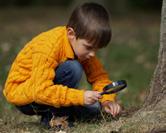
Sometimes we’re all too busy looking at the big picture to notice the small details within it. Grab yourself a magnifying glass and go explore the little things that are all around you in the natural world. What’s the smallest thing that you can find?

Maps offer a birds’ eye view of an area, showing all the detail of what’s there. Can you create your own map of the area where you live? What are the things you can see as you walk along the path? Perhaps you could include trees, hedges, ponds, houses and road turnings.
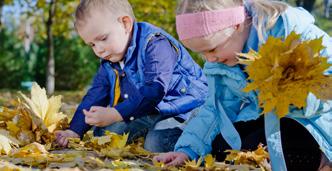
As the trees shed their leaves for another year, collect those you can find that have already fallen. Clearing a space on the ground as your canvas, use leaves and other objects you might have found to make your own works of art for others to enjoy.
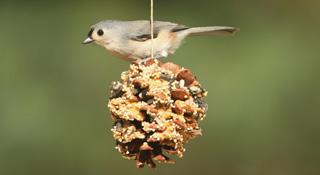
As we approach the cooler months, your local garden birds will be grateful for extra food that you can leave out for them. You can make your own bird feeders using things you find in the natural world. Open pine cones are perfect for this. Mix some seeds, oats, dried fruit or perhaps some grated cheese into some suet, lard or vegetable shortening and then smear it over the pine cone and hang somewhere the birds can easily reach it.
By Sarah Lindsley
As October draws to an end and the nights get colder and darker, hedges get wrapped in cobwebs and giant spiders hang from doorways. Children chat excitedly about costumes and supermarket shelves are emptied of sweets.
Modern day Halloween is huge in the UK with an astonishing £1 billion spent on the celebration in 2023. But what is it that gets us so excited about 31 October? Well, it’s a chance to dress up, indulge that sweet tooth and have some seriously spooky fun. And when else is it acceptable to knock on strangers’ doors and eat sweets all night?
So, whether you are hitting the neighbourhood with your witch’s cape and cauldron or cuddling up on the sofa with a scary movie, here are some top ideas to make this Halloween a celebration to remember.

TRICK OR TREAT!
Being allowed to dress up, go outside in the dark and knock on your neighbours’ doors shouting ‘trick or treat?’ is a dream come true for lots of children. Not to mention the buckets of sweets and chocolates which follow! Costumes range from the traditional witches and vampires to a more modernday take on the theme; science fiction and television-inspired characters such as Spiderman and Barbie. Or why not get creative and make your own costume? An old sheet with some eye holes cut out of it makes a very convincing ghost.

HELLO PUMPKIN!
Nothing says Halloween like a pumpkin carving session. Design your own or get inspiration online. And if you’re feeling really adventurous, head to your nearest pumpkin patch in October to pick your own pumpkin!


FACE PAINTING FUN

Staying in is the new going out, after all. Invite your neighbours round for some Halloweenthemed party games like apple bobbing or pin the hat on the witch. Introduce a murder mystery game or tie doughnuts to a string and see who can eat them off quickest - older kids will be begging to be involved too.

For younger children who might not fancy the full trick-or-treating experience, you can still get into the Halloween spirit at home and decorate the house for some festive fun. Spiders webs cut out of paper look great draped around the bedroom or hang some toilet roll bats from your windows and hear the trick-or-treaters scream!

If you don’t fancy the all-out DIY costume, you can have some fun with face paints and the whole family can get involved. Spooky spiders and cute cats step this way!

From the charming Coraline to the terrifying The Blair Witch Project for the braver teens in your life, Halloween is the perfect time to cosy up on the sofa, make some popcorn and settle in for a family scary movie marathon.

HALLOWEEN BAKE OFF
Halloween provides the perfect excuse to get creative in the kitchen and little hands can get involved too. Why not bake some skeleton biscuits using simple shop-bought moulds? Use coloured icing to give your sweet treats the fear factor. The messier the better...
Get the firepit going and toast some marshmallows. Once the s’mores are being devoured and the ghost stories begin, Halloween is in full swing for everyone.


